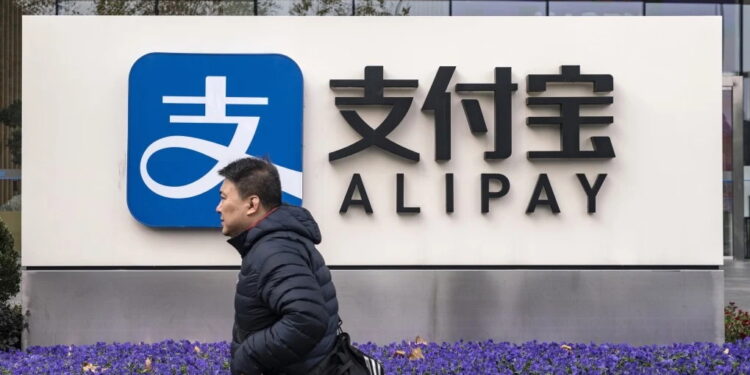Alipay heavily promotes "cryptocurrency funds"! Is China’s financial market policy ushering in a maj
 summary:
Alipay heavily promotes "cryptocurrency funds"! Is China’s financial market poli...
summary:
Alipay heavily promotes "cryptocurrency funds"! Is China’s financial market poli... Alipay heavily promotes "cryptocurrency funds"! Is China’s financial market policy ushering in a major reversal?
As the end of the year approaches, market attention once again focuses on the Federal Reserve's actions. Meanwhile, a recent move by Alipay has sparked widespread discussion in the industry. Alipay's homepage featured advertisements promoting "cryptocurrency funds," raising the question: does this signal a possible relaxation of China's stance on virtual currencies? This article explores the background, impacts, and potential future trends behind this development.
Alipay and Cryptocurrency Fund Promotions
According to reports from Wu Blockchain, some users in mainland China recently noticed cryptocurrency fund advertisements on Alipay's fund homepage. These ads included attention-grabbing phrases like "global investment, cryptocurrency surge, start with just 10 yuan, get in now." The fund in question, identified as "Huabao Overseas Technology C," is a Qualified Domestic Institutional Investor (QDII) fund, with a daily purchase limit of 1,000 RMB.
This promotion has fueled speculation about whether China might lift its cryptocurrency ban. The Huabao Overseas Technology C fund primarily invests in overseas tech-themed funds, including ETFs that hold cryptocurrency-related assets like Coinbase stock and Bitcoin spot ETFs. This indirect cryptocurrency investment approach, enabled by the QDII system, highlights the flexibility of China's regulatory framework.
QDII System and Its Operation
The QDII (Qualified Domestic Institutional Investor) system, introduced by China in 2006, allows approved domestic institutions to participate in international capital markets. Due to China's strict foreign exchange controls, direct overseas investments by individuals or institutions have been restricted. The QDII fund offers a compliant channel for investors.
The Huabao Overseas Technology C fund also includes FOF (funds of funds) and LOF (listed open-end fund) features, enabling investors to purchase the fund through traditional methods or trade it on exchanges. This structure provides both flexibility and compliance with domestic and international regulations.
The Truth About Cryptocurrency Investment Proportions
Disclosure reports show that Huabao Overseas Technology C is not a purely "cryptocurrency fund." Its cryptocurrency-related assets make up a relatively small portion of its holdings. According to its Q3 2024 report, 87.5% of the fund's assets are invested in other funds, 8.9% are bank deposits and clearing reserve funds, while 3.6% are other assets.
An in-depth analysis of the fund's core investment portfolio reveals that five of the top ten holdings are ARK ETFs, which include Coinbase stock and Bitcoin spot ETFs. The fund’s actual cryptocurrency investment proportions are 4.93% and 2.98%, totaling approximately 7.92%. Compared to the fund’s total size, this percentage is relatively limited, suggesting that the promotion’s focus on cryptocurrency is more about attracting investor attention.
China's Stance on Cryptocurrency Regulation
Despite the Alipay promotion sparking speculation of a possible easing of China's cryptocurrency regulations, there have been no fundamental changes in China's regulatory stance. Since 2021, the People’s Bank of China and ten other agencies have issued a notice reinforcing the need to prevent and control risks related to virtual currency trading.
Recently, various local governments have reiterated the ban on providing venues, advertising, and traffic direction for cryptocurrency-related businesses. Although the QDII fund structure largely mitigates legal risks, Alipay’s promotional actions still carry some public perception risks.
International Trends and Market Impact
Globally, cryptocurrency is gradually gaining acceptance. Some countries have even adopted Bitcoin as part of their national reserves. However, China remains cautious. While Hong Kong introduced a regulatory framework for virtual assets in 2023, its impact on mainland China has been limited.
Binance founder Zhao Changpeng has argued that Bitcoin, as the world’s only "hard asset," holds strategic value. He believes that if major economies like the U.S. adopt similar strategies, China might follow. However, given China’s current foreign exchange controls and resistance to decentralized currencies, this scenario seems unlikely in the short term.
How Investors Should View Indirect Investment Models
For retail investors, QDII funds provide a compliant and indirect way to participate in cryptocurrency investments. However, it’s important to note that this method may yield lower returns compared to direct cryptocurrency holdings. For instance, Huabao Overseas Technology C’s net asset value growth rate of 25.02% this year exceeds the 16.25% return of the Shanghai Composite Index but lags behind Bitcoin’s gains.
Additionally, the fund’s relatively high management and custody fees further reduce potential returns. Investors should carefully consider these factors to avoid unnecessary losses stemming from misunderstandings about cryptocurrency investments.
Future Developments and Possible Regulatory Trends
Although China's current stance on cryptocurrencies remains cautious, there may be a gradual shift toward more flexible regulatory approaches, particularly through Hong Kong as a pilot zone for virtual asset markets.
In the long run, if major economies like the U.S. begin to treat Bitcoin as part of their strategic reserves, China might adjust its policies accordingly. However, this adjustment will depend on various factors, including the domestic economic environment, foreign exchange control requirements, and international developments. Until then, indirect investment models like QDII funds may remain the primary option for domestic investors to access cryptocurrency markets.
Tags: Cryptocurrency, Alipay, QDII, Regulatory Policy, Investment Methods


